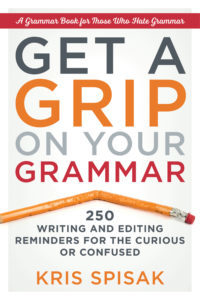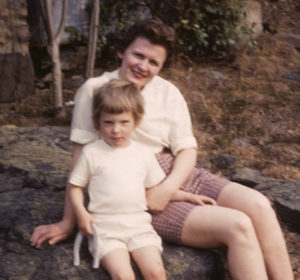![Things that Make Us [Sic]](http://abwestrick.com/wp-content/uploads/2018/03/Things-That-Make-Us-Sic-200x300.jpeg) I love talking craft—character development, plot, point of view, pacing, setting, dialogue. But hey, when a reader can’t get into a scene because the grammar is funky, the writer needs to get back to basics.
I love talking craft—character development, plot, point of view, pacing, setting, dialogue. But hey, when a reader can’t get into a scene because the grammar is funky, the writer needs to get back to basics.
Grammar. Got to know it. Got to use it right. Stop dangling those participles. Move those misplaced modifiers into place. Find agreement between every subject and verb. On split infinitives and prepositions at the ends of sentences, these days I hear we’re allowed some leeway. In Things that Make Us [Sic], Martha Brockenbrough sets us straight and fills us in on the reasons why such rules were adopted in the first place. Thank you, Martha!
 If your bugaboo is word choice, check out Get a Grip on Your Grammar by Kris Spisak and change further to farther when talking about measurable physical distances, okay? If you want a comprehensive tome, there are plenty on the market. Perfect English Grammar looks good. I have Diana Hacker’s Rules for Writers on my desk, and there’s always Strunk and White’s classic, The Elements of Style (but that one is rather dry).
If your bugaboo is word choice, check out Get a Grip on Your Grammar by Kris Spisak and change further to farther when talking about measurable physical distances, okay? If you want a comprehensive tome, there are plenty on the market. Perfect English Grammar looks good. I have Diana Hacker’s Rules for Writers on my desk, and there’s always Strunk and White’s classic, The Elements of Style (but that one is rather dry).
However writers go about learning the basics, they need to go about it. I grew up with a mom who interrupted me when my grammar wasn’t right. She drilled lay versus lie into me so many times, I got it. (Hear me, Mom? I got it.) But these days I often see or hear lay where lie would be correct, and have to bite my tongue. It seems lay has slipped into our vernacular the same way hopefully has. Hopefully, you’ll understand. (But no! That’s grammatically incorrect. And if Kris Spisak comes out with a sequel, I hope she’ll explain the difference.)
 English usage and grammar aren’t intuitive, and it helps to learn the rules and exceptions early-on. But I’ll be the first to admit that early-on I found my mom’s instruction maddening. (Mom. The content of what I’m telling you is more important than the way I’m saying it.) I might as well have been talking to a tree. When my grammar went awry, she didn’t hear another word—not until I’d rephrased my sentence correctly. Then she’d say, “Yes, now, go on.”
English usage and grammar aren’t intuitive, and it helps to learn the rules and exceptions early-on. But I’ll be the first to admit that early-on I found my mom’s instruction maddening. (Mom. The content of what I’m telling you is more important than the way I’m saying it.) I might as well have been talking to a tree. When my grammar went awry, she didn’t hear another word—not until I’d rephrased my sentence correctly. Then she’d say, “Yes, now, go on.”
The problem for writers is that bad grammar throws off a reader’s ability to settle into a fictional world. It’s worth a writer’s time to learn to get it right. The good news is that Brockenbrough and Spisak are entertaining writers (my mom grew up on Strunk and White), but I’ll bet they can’t make an apple pie anywhere near as good as my mom’s pies, so there’s that. Happy writing, everyone!

Planning to buy Get a Grip on Your Grammar. Despite a prep school education I make the same grammatical mistakes. In 4th grade we diagrammed sentences. My mind would go blank while the teacher stood behind me spewing insults. No pie.
Hahaha. No pie. I hear you! Sometimes beta readers are awesome at flagging stuff. In her book, Martha Brockenbrough says no one gets it 100% right. Grammar is just too crazy. It’s a minefield. But we keep plugging away…
Writers lose me at it’s and you’re in place of the possessives its and your, or mixing up there, their, and they’re. And along with farther and further, there’s always fewer and less.
Agreed! And I’m amazed when I read a published book with errors like the ones you’ve mentioned. I’m not bothered by few-less-further-farther errors when they’re in the voice of the protagonist. Those are allowed because they’re the way the character speaks. No problem. Often, I find unique voices engaging. Instead, I’m talking about narrative passages where the grammar is just plain sloppy. All of your examples, Lyn, are moments of sloppiness, and we sometimes encounter these errors in print from reputable publishers. Makes me wonder who the editors are.
Sounds like a must have!
Yes, a must-have and fun to read (unlike Strunk and White, just saying).
I regularly see errors in the basics, especially possessives, in the NYT and WP. While I’m cringeing, I tell myself those writers are under constant time pressure and the importance of the story outweighs the little things. But I still cringe.
The on-air reporters on NPR make so many S-V agreement errors that I swear someone is teaching them to make the verb agree with the noun just before it, even if that’s not the subject. And don’t get me started on “a bunch of…”
Also, the “one hopes that” meaning of “hopefully” is now accepted by at least one major dictionary (I forget which) as correct. So we can save our red ink on that one.
So that meaning of “hopefully” is okay? Okay. The singular “they” is now acceptable, too, but it makes me pause. I struggle to wrap my brain around it, even though I know its purpose (helping to address/fix English’s gender binary problem) is healthy. Language is a living thing! Moving onward…